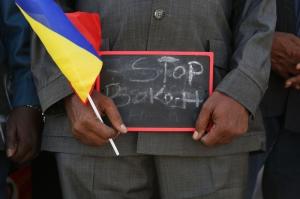Iraqi Christians: Politicians Pushing Us to Leave
BAGHDAD - Iraq's prime minister sought safeguards Sunday for small religious communities in this mainly Muslim country as Christians protested parliament's decision to stop setting aside seats for minorities on provincial councils.
In Baghdad, a series of explosions struck mostly Shiite areas, killing at least 32 people and wounding nearly 100, police said. The attacks appeared aimed at reviving sectarian tensions that once threatened to plunge the nation into civil war.
Parliament last week approved a new law mandating elections in most of Iraq's 18 provinces. But the law removed a system that reserved a few legislative seats for Christians and other religious minorities.
Lawmakers cited a lack of census data to determine what the quotas should be. But many Christians saw the move as an effort to marginalize their community.
"I think that some political groups are pushing the remaining Christians to leave Iraq," worshipper Afram Razzaq-Allah said after services at a Catholic church in Baghdad. "They want us to feel that we are no longer Iraqis."
In a letter sent to parliament Sunday, Prime Minister Nouri al-Maliki appealed to the legislators and the electoral commission to restore the quota system.
"The minorities should be fairly represented in the provincial councils and their rights should be guaranteed," al-Maliki wrote.
Hundreds of Christians staged street protests after Sunday church services in and around Mosul, a northern city where many of the country's Christians live. Some said the removal of the quotas is an attempt to force them to leave Iraq.
"This is an unjust decision and it affects our rights as Christians," Matti Galia, a local politician, said at a rally in Mosul. "We are original citizens in this country. The politicians' goal was to divide the Iraqi people and create more struggles. Indirectly, they are telling us to leave Iraq."
Iraq's Christians have been targeted by Muslim militants since the U.S.-led invasion in 2003, with priests, churches and Christian-owned businesses attacked. The violence has led many Christians to flee the country.
Sectarian violence has receded since U.S. troop reinforcements were sent in last year. However, U.S. commanders have warned that extremist groups such as al-Qaida in Iraq are still trying to rekindle sectarian warfare to undermine the U.S.-backed Iraqi government.
The string of explosions in the capital Sunday began near sundown as Muslims were preparing for Iftar, the meal that breaks the daily fast during the holy month of Ramadan.
The deadliest blasts occurred in the Karradah neighborhood, where a parked car loaded with explosives blew up in a commercial area about 7 p.m., killing 19 people and wounding 72, police and hospital officials said.
Police said that about 90 minutes earlier, two car bombs exploded nearly simultaneously in the Shurta Rabaa and Amil districts of west Baghdad, but the U.S. military said later that the car in Amil blew up due to an electrical fire.
Twelve people were killed and 35 wounded in the Shurta Rabaa blast, and one person died and two were injured in the Amil explosion, police said.
Also Sunday, snipers fired on an Iraqi army checkpoint, killing two soldiers and a civilian in the eastern Zayona neighborhood of Baghdad. A roadside bomb killed an Iraqi soldier on a patrol in Mansour, a mostly Sunni area in the city's west, police officials said.
Two civilians were killed in an armed attack in the town of Khan Bani Saad by a group believed tied to al-Qaida, a police official in Diyala province said. The town is near the provincial capital of Baqouba.
The same official said two Iraqi soldiers were killed and 10 wounded when a bomb targeted them in Balad Ruz, 45 miles northeast of Baghdad late Saturday.
Also Sunday, an Iraqi official said the country signed preliminary deals with General Electric Co. and Siemens AG to upgrade the electricity grid, which has been ravaged by years of war, sanctions and neglect.
Lengthy power outages have been common in Iraq, with some Baghdad areas getting as little as four hours of electricity a day. The problem has been a major cause of discontent during the summer when the heat is punishing.
Associated Press writers Qassim Abdul-Zahra and Bushra Juhi contributed to this report.



























